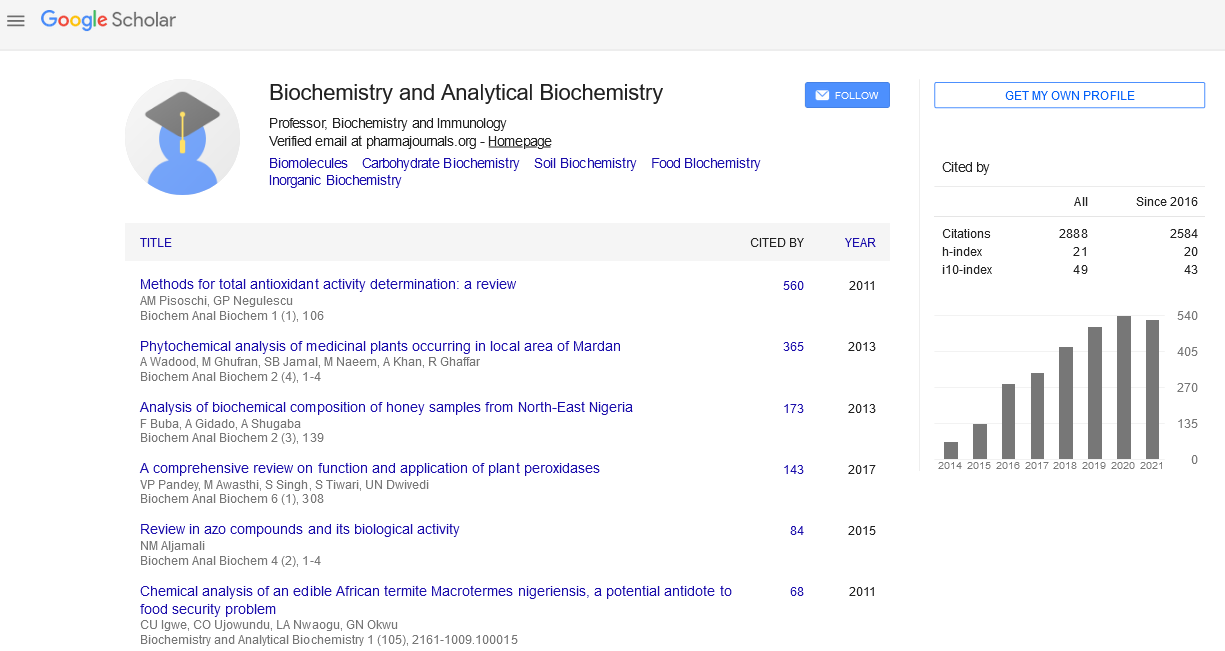Indexed In
- Open J Gate
- Genamics JournalSeek
- ResearchBible
- RefSeek
- Directory of Research Journal Indexing (DRJI)
- Hamdard University
- EBSCO A-Z
- OCLC- WorldCat
- Scholarsteer
- Publons
- MIAR
- Euro Pub
- Google Scholar
Useful Links
Share This Page
Journal Flyer

Open Access Journals
- Agri and Aquaculture
- Biochemistry
- Bioinformatics & Systems Biology
- Business & Management
- Chemistry
- Clinical Sciences
- Engineering
- Food & Nutrition
- General Science
- Genetics & Molecular Biology
- Immunology & Microbiology
- Medical Sciences
- Neuroscience & Psychology
- Nursing & Health Care
- Pharmaceutical Sciences
Hepcidin maturation: The possible role of alpha-1 antitrypsin
International Conference on Clinical Chemistry & Laboratory Medicine
October 17-18, 2016 Chicago, USA
Attila Miseta
University of Pécs, Hungary
Scientific Tracks Abstracts: Biochem Anal Biochem
Abstract:
Hepcidin is a 25AA peptide hormone made in the hepatocytes. The primary role of hepcidin is in the regulation of iron homeostasis. Similarly to many other peptide hormones it undergoes maturation meaning that the primary 84 AA product of the HAMP gene is cleaved to 60AA prohepcidin and subsequently to the 25 AA active compound. Both prohepcidin and hepcidin is present in circulation. In addition some shorter forms were also detected, 22 and 20AA long respectively. Furin type serine proteases are known to be responsible for the maturation/degradation of the primary peptide product. We used a bacterial two-hybrid system to identify possible significant interactions to uncover why there is so much prohepcidine in the serum. Screening assays were carried out on a human liver cDNA library. Preprohepcidin screening gave the following results: alpha-1 antitrypsin, transthyretin and alpha-1-acid glycoprotein showed strong interactions with preprohepcidin. We further confirmed and examined the alpha-1 antitrypsin binding in vitro (glutathione S-transferase, pull down, coimmunoprecipitation, MALDI-TOF) and in vivo (ELISA, crosslinking assay). Our results demonstrated that the serine protease inhibitor alpha-1 antitrypsin binds preprohepcidin within the cell during maturation. Furthermore, alpha-1 antitrypsin binds prohepcidin significantly in the plasma. This observation may explain the presence of prohormone in the circulation, as well as the post-translational regulation of the mature hormone level in the blood. In addition, the lack of cleavage protection in patients with alpha-1 antitrypsin deficiency may be the reason for the disturbance in their iron homeostasis.
Biography :
Attila Miseta has completed his MD at the Medical University of Pécs in 1984 and received his PhD in 1995. He has spent more than 5 years in the USA as Postdoc and Visiting Professor. He is the Director of the Department of Laboratory Medicine at the University of Pécs Medical School. He has published more than 70 papers in PubMed listed journals and has been serving as an Editorial Board Member of three international journals.
Email: attila.miseta@aok.pte.hu


